Behold the picture of levothyroxine 75 mcg, a medication that plays a crucial role in managing thyroid hormone deficiencies. Join us as we delve into its significance, dosage, side effects, and essential information to empower you with knowledge about this vital treatment.
Levothyroxine, a synthetic hormone, mimics the natural thyroid hormone thyroxine (T4) and is used to treat hypothyroidism, a condition where the thyroid gland produces insufficient thyroid hormones. Understanding the picture of levothyroxine 75 mcg is paramount for proper medication management and optimal health outcomes.
Image Description
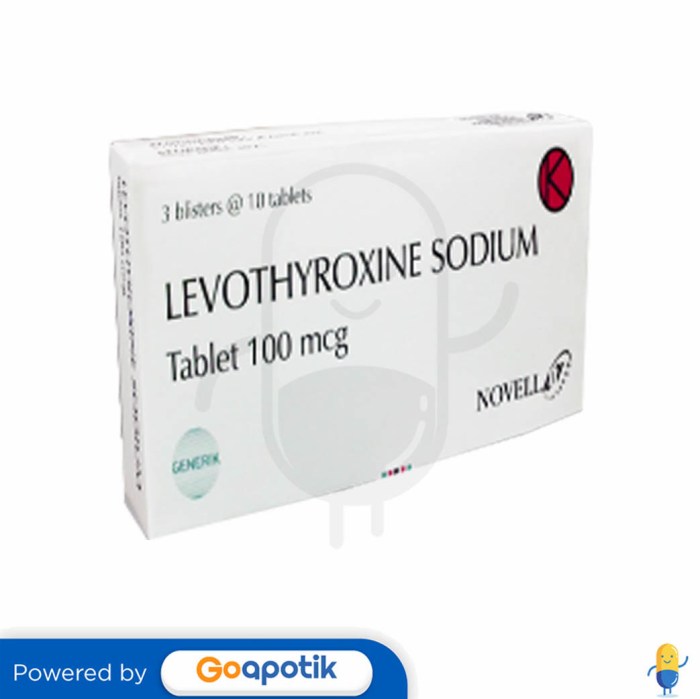
The picture of levothyroxine 75 mcg depicts a small, white, rectangular tablet. The tablet has a score line in the middle, dividing it into two equal halves. The imprint “75” is clearly visible on one side of the tablet, indicating the dosage of levothyroxine it contains.
Dosage Information
The dosage information (75 mcg) displayed on the picture is significant as it represents the amount of levothyroxine present in each tablet. Levothyroxine is a synthetic form of thyroid hormone used to treat hypothyroidism, a condition in which the thyroid gland does not produce enough thyroid hormone.
The dosage of levothyroxine prescribed for each patient is determined by their individual needs and is typically adjusted based on regular blood tests to monitor thyroid hormone levels.
Levothyroxine Overview
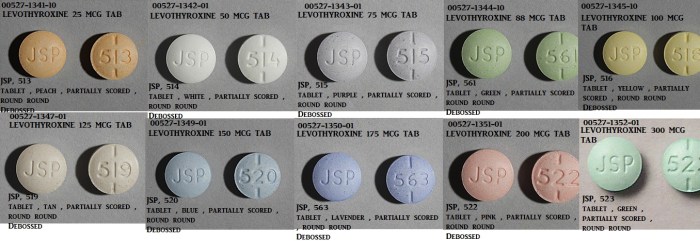
Levothyroxine is a synthetic hormone used to treat thyroid hormone deficiencies. It is identical to the naturally occurring thyroid hormone thyroxine (T4) and works by replacing or supplementing the body’s production of T4.
Mechanism of Action
Levothyroxine works by binding to thyroid hormone receptors in the body’s cells. This binding triggers a cascade of events that ultimately leads to increased production of proteins involved in metabolism, growth, and development.
Dosage and Administration
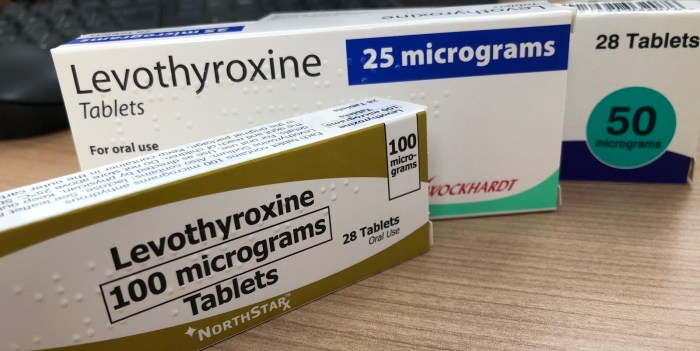
Levothyroxine 75 mcg is a medication used to treat hypothyroidism, a condition in which the thyroid gland does not produce enough thyroid hormone. The typical dosage range for levothyroxine 75 mcg is 50 to 100 mcg per day, taken once daily.
It is important to take levothyroxine exactly as prescribed by your doctor, and to not skip or stop taking the medication without talking to your doctor first.
When to Take Levothyroxine
Levothyroxine should be taken on an empty stomach, at least 30 minutes before eating or drinking anything other than water. This will help your body absorb the medication more easily. If you are taking other medications, be sure to tell your doctor so they can check for any potential interactions.
Consistent Dosing and Monitoring, Picture of levothyroxine 75 mcg
It is important to take levothyroxine at the same time each day, and to not skip or stop taking the medication without talking to your doctor first. Consistent dosing will help to keep your thyroid hormone levels stable, which is important for managing your hypothyroidism.
Your doctor will monitor your thyroid hormone levels regularly to make sure that your medication is working properly and that your dosage is correct.
Potential Side Effects
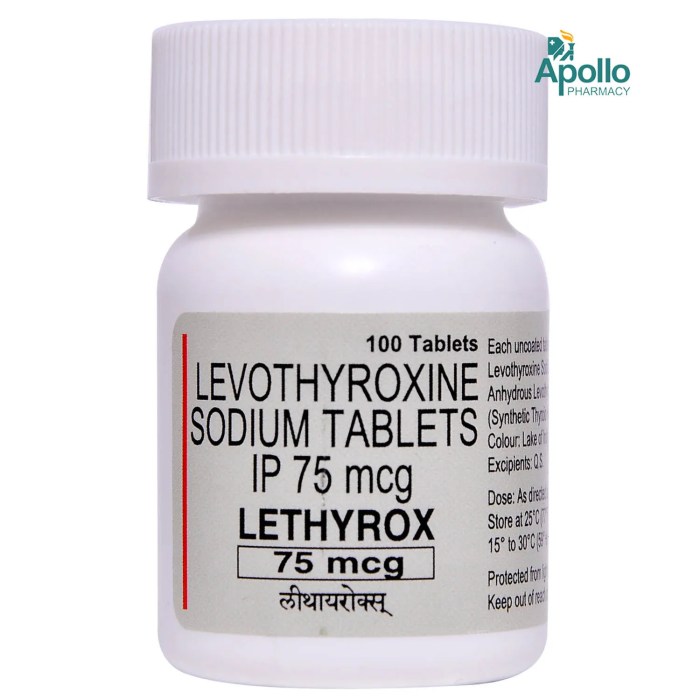
Levothyroxine 75 mcg, like any medication, can cause side effects. It’s important to be aware of these potential effects and discuss them with your healthcare provider.
Need a quick reference for your picture of levothyroxine 75 mcg? Check out our comptia a+ 1102 practice exam for more details on the topic. The levothyroxine 75 mcg picture will help you visualize the medication and understand its dosage.
Common Side Effects
Most people taking levothyroxine 75 mcg experience mild side effects, if any. Common side effects include:
- Headaches
- Diarrhea
- Nausea
- Vomiting
- Anxiety
- Insomnia
- Weight loss
These side effects are typically mild and temporary, resolving within a few days or weeks. However, if any of these side effects become severe or persistent, it’s crucial to contact your healthcare provider.
Rare but Serious Side Effects
In rare cases, levothyroxine 75 mcg can cause more serious side effects, such as:
- Heart problems (e.g., rapid or irregular heartbeat)
- Bone loss (osteoporosis)
- Kidney problems
- Liver problems
- Allergic reactions
If you experience any of these serious side effects, seek immediate medical attention.
Managing Side Effects
To manage potential side effects of levothyroxine 75 mcg, follow these tips:
- Take your medication as prescribed by your healthcare provider.
- Report any side effects to your healthcare provider promptly.
- Do not adjust your dosage without consulting your healthcare provider.
- Follow a healthy lifestyle, including a balanced diet and regular exercise.
By following these tips, you can help minimize the potential side effects of levothyroxine 75 mcg and improve your overall well-being.
Drug Interactions
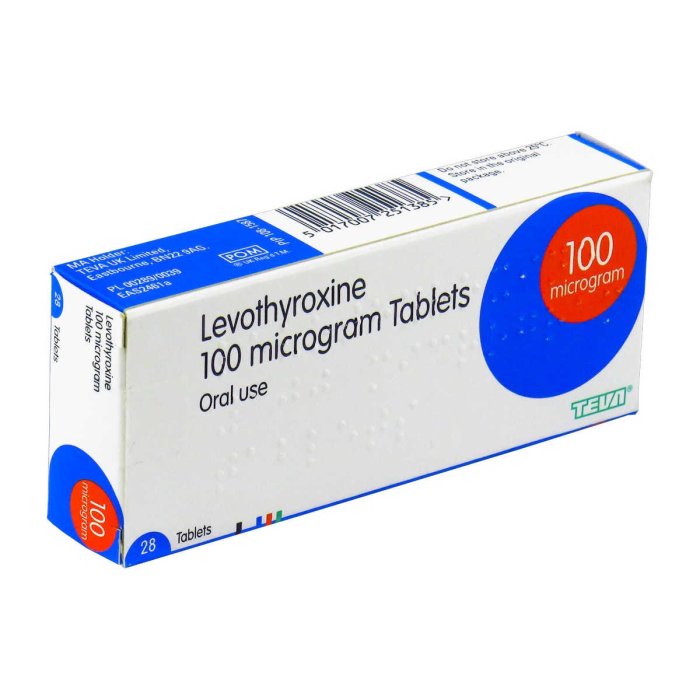
Levothyroxine can interact with various medications, potentially affecting its absorption, metabolism, or elimination. Understanding these interactions is crucial to ensure optimal treatment outcomes and minimize adverse effects.
Medications that Increase Levothyroxine Absorption
Certain medications, such as cholestyramine, colestipol, and aluminum hydroxide, can bind to levothyroxine in the gastrointestinal tract, reducing its absorption. It is recommended to separate the administration of levothyroxine from these medications by at least 4 hours.
Precautions and Contraindications
Levothyroxine 75 mcg is generally safe and well-tolerated, but there are certain precautions and contraindications to consider before taking it:
Pregnancy and Breastfeeding
Levothyroxine is generally considered safe during pregnancy and breastfeeding. However, it is important to monitor thyroid hormone levels closely during these periods and adjust the dosage as needed.
Underlying Heart Conditions
Patients with underlying heart conditions, such as coronary artery disease or arrhythmias, should use levothyroxine with caution. High doses of levothyroxine can increase the heart rate and worsen these conditions.
Adrenal Insufficiency
Levothyroxine should be used with caution in patients with adrenal insufficiency. Adrenal insufficiency can impair the conversion of levothyroxine to its active form, leading to insufficient thyroid hormone levels.
Iodine Sensitivity
Individuals with iodine sensitivity should exercise caution when taking levothyroxine. Levothyroxine contains iodine, which can trigger allergic reactions in sensitive individuals.
Contraindications
- Untreated pituitary or adrenal insufficiency
- History of thyroid storm
- Severe heart disease
- Uncontrolled hypertension
Storage and Handling: Picture Of Levothyroxine 75 Mcg
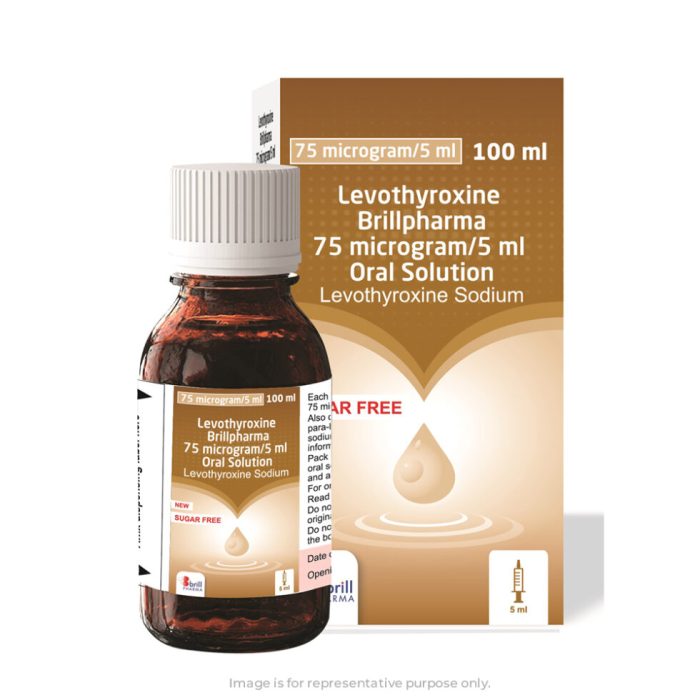
Proper storage and handling of levothyroxine 75 mcg are essential to maintain its effectiveness and prevent degradation. Follow these guidelines to ensure optimal medication use:
Protect from Heat, Light, and Moisture:
- Store levothyroxine in a cool, dry place away from direct sunlight.
- Keep the medication in its original container with a tightly closed lid.
- Avoid storing the medication in humid areas, such as bathrooms or near sinks.
Temperature Control:
- Store levothyroxine at room temperature between 59°F and 86°F (15°C and 30°C).
- Do not freeze or expose the medication to extreme temperatures.
Expiration Dates:
- Check the expiration date on the medication package before use.
- Discard any unused medication after the expiration date.
Essential Questionnaire
What is the significance of the 75 mcg dosage in the picture?
The dosage of 75 mcg indicates the amount of levothyroxine present in each tablet or capsule. It is a common dosage used to treat mild to moderate hypothyroidism.
How should I take levothyroxine 75 mcg?
Levothyroxine 75 mcg should be taken orally, once daily, on an empty stomach, at least 30 minutes before breakfast. It is important to take the medication consistently at the same time each day.
What are some potential side effects of levothyroxine 75 mcg?
Common side effects include increased heart rate, anxiety, nervousness, and weight loss. More severe side effects, such as chest pain, irregular heartbeat, and muscle weakness, are rare but require immediate medical attention.